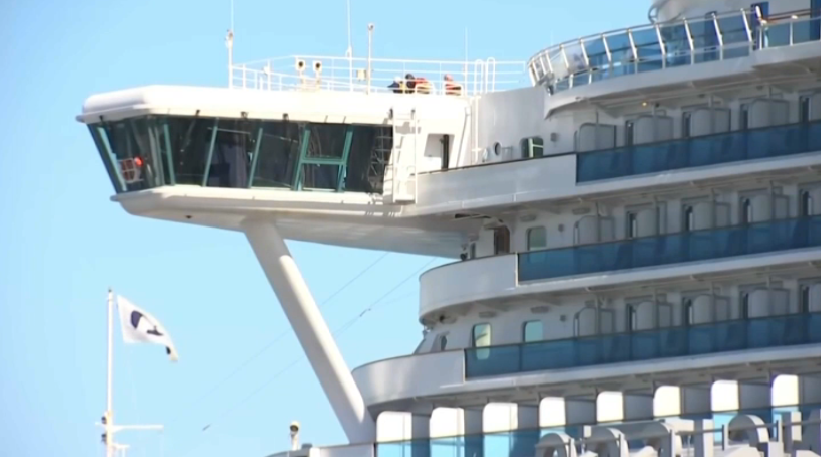
Grand Princess cruise ship in San Francisco. (Feb. 21, 2020)
Cruise ships hit by coronavirus outbreaks have quickly found themselves with no ports for thousands of passengers as countries on four continents have quarantined vessels or kept them at sea for days.
Keeping all the passengers on board instead of letting them disembark on land is a strategy that can backfire, however, according to experts, because the ventilation systems and close quarters of cruise ships make them ideal places for illness to jump from one person to the next.
“They’re not designed as quarantine facilities, to put it mildly,” said Don Milton, an epidemiologist with the University of Maryland.
A ship with more than 3,500 people aboard was sailing in circles off the coast of California on Saturday after 19 crew members and two passengers tested positive for the new virus. Originally bound for San Francisco, the Grand Princess might be sent instead to a non-commercial port, officials said.
While restaurants and other shipboard locations were closed, passengers were able to watch TV and use the internet, or if they were lucky enough to have one, go outside on their balcony overlooking the water.
Passenger Karen Schwartz Dever said she and her husband were enjoying their balcony and keeping themselves busy with playing cards, while meals and water were being delivered by room service. But she worried about some of the other passengers.
“I met someone who is in the middle of chemo for cancer,” she said. “There are people on oxygen. There are also children on board. I can’t imagine what it’s like if they are in an inside cabin.”
While President Donald Trump has said he doesn’t want the Grand Princess to dock, he also said he would yield to the advice of health officials. Refusing to let the ship into port for an extended period could hasten the spread of the virus on board, experts said.
Milton, who studies the spread of virus particles in the air, said recirculating air on a cruise ship’s ventilation system, along with people living in close quarters and in communal settings, make the vessels vulnerable to the spread of infection.
“You’re going to amplify the infection by keeping people on the boat,” he said.
A Purdue University air quality expert said cruise ship air conditioning systems are not designed to filter out particles as small as the coronavirus.
“The passengers should be quarantined on shore if there is a suitable facility,” Qingyan Chen said in an email message. Grand Princess “should run 100% outdoor air in their air conditioning system and not use recirculated air.”
Top cruise line executives met Saturday with Vice President Mike Pence at Port Everglades in Fort Lauderdale, Florida, after which Pence announced “significant changes” to the industry going forward, but gave no indication what would happen next with the Grand Princess.
Pence said cruise officials agreed to enhanced entry and exit screenings and to establish shipboard testing for the virus, along with new quarantine standards established by the U.S. Centers for Disease Control and Prevention. The industry also was asked to come up with and fund a new plan on how to transport cruise passengers who contract the disease.
Princess officials said the new protocols include asking all new passengers to sign a health declaration, and temperature screenings as passengers leave. Anyone coming from a “high-risk area is also undergoing a medical evaluation,” Dr. Grant Tarling, chief medical officer for Carnival Corporation, told reporters.
Government officials made it clear in their language that they were walking a fine line with industry officials about the best way to prevent the disease from spreading without causing significant economic hardship to cruise lines.
“We want to ensure the American people can continue, as we deal with the coronavirus, to enjoy the cruise line industry,” Pence said.
Meanwhile, Princess officials also appeared frustrated about the lack of detail on the Grand Princess’ next steps, repeatedly telling reporters they were waiting for definitive information about when and where the ship will dock, who will be tested, and whether passengers will be allowed to get off.
“We need to get the ship into a port as soon as possible,” said Jan Swartz, group president of Princess Cruises and Carnival Australia.
In Japan, leaders were criticized for confining more than 3,700 passengers and crew on the Diamond Princess for two weeks last month because of the virus. About 700 people were sickened on the ship and three died. Japanese health officials defended the quarantine as necessary and adequate.
In Asia, the Malaysian port of Penang turned away the cruise ship Costa Fortuna with 2,000 people aboard because there were 64 passengers from Italy, the center of Europe’s epidemic. It was the second port after Phuket in Thailand to reject the ship, which is now headed to Singapore.
In Egypt, a cruise ship on the Nile with more than 150 aboard was quarantined after 12 people tested positive for the virus. And on the Mediterranean in Malta, which reported its first case of the virus, the MSC Opera agreed not to enter port even though there were no infections confirmed on board.
Art Reingold, head of the epidemiology and biostatistics division at the University of California, Berkeley School of Public Health, said the burden is on authorities to coordinate the feeding and care of so many people without spreading the infection further.
“It’s obviously going to be a real challenge,” he said. “I don’t have any doubt that crew members interact with passengers, so it seems quite plausible there could be additional transmissions.”
The challenge is not an entirely new one: Ships have previously been affected by other diseases, such as norovirus, which causes vomiting and diarrhea and can spread quickly in the close quarters of a ship and among passengers with weakened immune systems.



